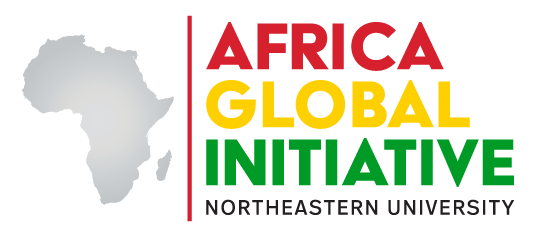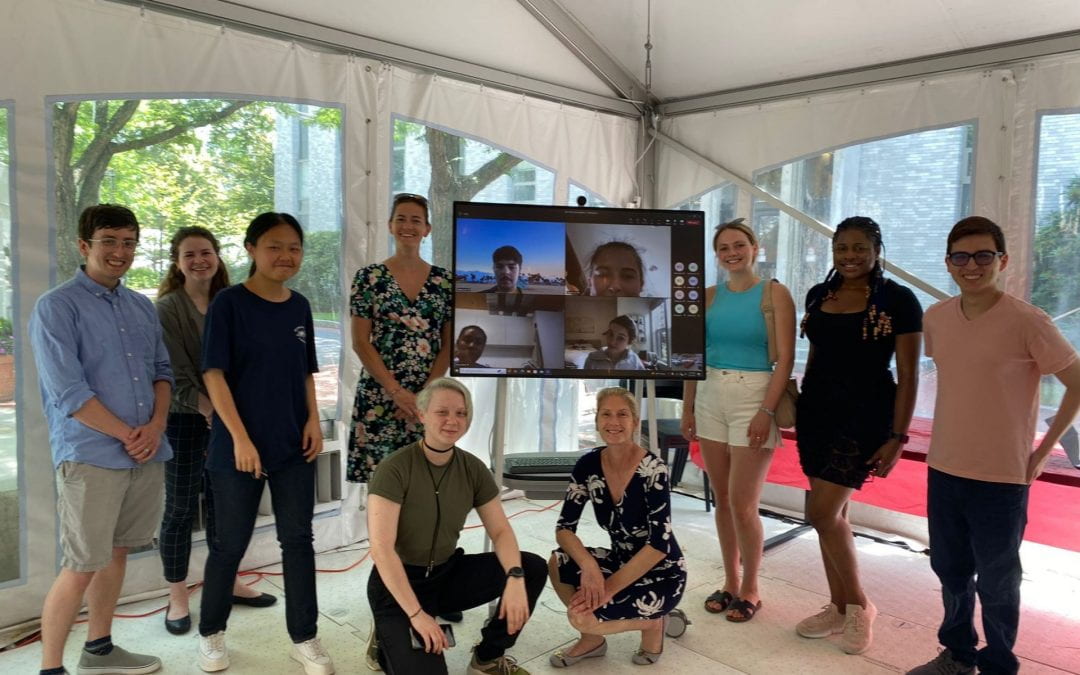By: Aspa Papanastasiou
Employer Engagement and Career Design in collaboration with Global Co-op Faculty run the brand-new Global Work Citizen summer badge program. This immersive month-long virtual program was designed especially for first year learners. It aimed to introduce Huskies to global partners early in their university journey and encourage students to cultivate a global mindset during and beyond their time at Northeastern. Through interactive sessions with some of our hand-picked global employers, universities and agency partners from around the world, students were able to interact, learn and engage in meaningful conversations about global challenges and differences in professional cultures. Elements of global agility, cultural humility, teamwork and innovation will be discussed during guided reflection sessions.
During the Africa week, students had the opportunity to interact live with staff and students of two great organizations:

Right To Dream is a Ghanaian football academy. The academy started in 1999 training a small number of boys in Accra and grew into a residential school and training center.
The Right to Dream Academy was founded in 1999 by Tom Vernon, who had been Manchester United’s head scout in Africa. It started on a small scale and, unlike most youth academies, independent of a professional team, training a small number of boys who were initially housed in Tom’s and (then-girlfriend, now wife) Helen’s home. Right to dream move to Old Akrade on the banks of the Volta in the Eastern region of Ghana, increasing its capacity from 40 to just over 100 students.
In 2013 Right to dream launches Africa’s first fully residential academy, with nine girls being the first to commence their life-changing scholarships at Old Akrade. In 2021 a new €100 million partnership enabling acceleration of growth of the RTD model staring with the announcement of a new academy and pro women’s team in Egypt and strategic investment to help bring greater access, opportunity & equality through football across the Right to Dream ecosystem. Looking into the future – the new residential academy in Egypt is scheduled for launch in Q1 2023; an exciting new academy complex sitting at the junction of both North African and Middle-Eastern football passions, offering a system of opportunities to talented Egyptian children through football, education and character development.
GWC participants interacted with students and alumni of RTD. This is what they had to say:
“I also wanted to give a brief shout-out and thank you to the students and faculty of Right to Dream Academy, the school in Ghana that combines student’s love for soccer with rigorous academic training. One thing I reflected on a lot this week is an inspirational quote we saw during their school tour. It went along the lines of “a person who asks a question is a fool for five minutes, but a person who does not ask is a fool for a lifetime”. I think this is a wonderful idea that has many applications.” James Robert Cribbs, GWC Badge Recipient
“To touch more upon the Right to Dream organization, I was amazed to learn about how one of the students at the academy, Bawa, was able to bring positive information and skills he learned back to his home town. This way, he was able to help his friends who weren’t fortunate enough to be in the RTD program because of all of the skills and character development he learned at the academy. This relates to one of our learning goals which is to demonstrate an understanding of the impact of global work experiences on local host communities while identifying the importance of cultural humility as a lifelong commitment. The RTD organization was helping far more students and individuals than those who they selected to attend their program. This is a great example of how these global experiences can shape other local communities and the individuals that they are made up of.” Annabelle Iannone, GWC Badge Recipient.
The High Atlas Foundation is a Moroccan association and a U.S. 501(c)(3) nonprofit organization founded in 2000 by former Peace Corps Volunteers committed to furthering sustainable development. HAF supports Moroccan communities to take action in implementing human development initiatives. HAF promotes organic agriculture, women’s empowerment, youth development, education, and health. Since 2011, HAF has Consultancy Status at the United Nations Economic and Social Council.
HAF is dedicated to local initiatives that community beneficiaries determine and manage:
- Sustainable agriculture:Nurseries of fruit trees and wild medicinal plants, irrigation efficiency, organic certification, technical skills-building, carbon sequestration, and commercialization
- Education:School infrastructure, gardens, and environmental stewardship
- Health:Clean drinking water and waste management
- Women’s and youth empowerment:Self-discovery, human rights, and cooperative development
- Capacity-building:Participatory planning and project, organizational, and environmental management

GWC participants interacted with HAF staff and enjoyed a rare treat – a tour of the central office by HAF President Dr. Yossef Ben-Mair! Here is one student’s reflection:
“Just looking at this week, I’ve never travelled to the continent of Africa, so being able to compare the various cultures just through nations like South Africa, Morocco, and Ghana alone helped me realize why the speakers held that sort of workplace culture and how that reflected on their performances. For instance, with the presentation from High Atlas Foundation, when given the tour of the office, it was easy to see their emphasis on relationships in the workplace, pushing workers to be interdependent and almost constantly socializing. Given the emphasis on constant work in the United States, a firsthand look at a workplace relationship like in Morocco might suggest that they’re not working efficiently enough or they’re wasting time on socializing rather than being productive. However, that is incredibly far from the truth. From conversations with employees and Dr. Ben-Meir, it was clear to see that their relationships actually enhanced their work, making people want to spend time in the workplace and communicate with their peers in order to actually maximize efficiency. For the “Now what?” question, I’d say there isn’t one specific strategy to address this difference. Likely, if you are an individual co-op student in an office in Morocco, it’d be beneficial for you to adjust more to practices there.” Catherine Prigov, GWC Badge Recipient
The program offered also connections to Oliver Hagan, Founder of Volunteer Adventure Corps and to Ademidun Ajibade, AGI Project Manager, who provided an overview of the Africa Global Initiative. This is what one student reported back about the sessions:
“In the interviews such as Oliver Hagan (founder & CEO, VACorps in Cape Town, South Africa), we discovered more about the uniqueness of South Africa, the overview opportunities through the organization and advice upon graduation. These interviews helped us find out more about how our interests can align with different countries that we probably have not expected. This week has managed us to discover ourselves in a cultural dimension aspect and compare towards our learning goals. By discovering African cultures through interviews and presentations such as Ademidun Adjebade’s on Africa Globe Initiative, we are immersed in learning and gaining knowledge on Africa as a whole. In addition, live presentations allowed us to see fantastic organizations, project our future plans as Global citizens, and establish skills and confidence in diverse and inclusive environments.” Alexia Chiriac, GWC Badge Recipient.


After thoroughly reviewing your message, I feel compelled to express that the insights you’ve provided are truly remarkable. They’ve significantly enriched my understanding. papa’s freezeria
Through meaningful interactions and guided reflections, participants That’s Not My Neighbor emerge with a deeper appreciation for diversity, a heightened sense of cultural humility, and a newfound confidence to contribute positively to the world.
The program also facilitated connections with industry leaders such as Oliver Hagan fnaf and Ademidun Ajibade, offering students invaluable insights into potential career pathways and the broader impact of global initiatives.
It’s a very wonderful and useful piece of knowledge. I’m delighted you shared this important knowledge with us. Please keep us updated like this. Please visit my poppy playtime website
Whenever I have a moment to spare, I find myself drawn to papa’s games for their captivating gameplay.
When it comes to financial analysis Fintechzoom is one of the best tools.